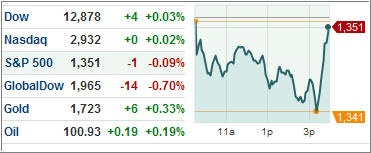Markets were relatively stagnant today despite the cancellation of a Greek bailout meeting. The atmosphere is becoming increasingly tense as the deadline looms, putting Greece’s chances of receiving bailout funds in jeopardy.
Despite flatness in equities, the 10-year Treasury dipped to 1.92%, a sign that investors remain in a risk adverse mood. A disorderly default in Greece could propel further flight to safety.
To add more insult to injury, Greece’s economy contracted almost 7% in 2011, meaning that there will be plenty of suffering in 2012 and the following years due to the new, stricter austerity measures. Greek PM Papademos has noted that a failure to resolve the country’s predicament can quickly lead to chaos.
To get a broad glimpse of the debt crisis through Europe, check out this debt map, showing debt-to-GDP levels country by country. Interestingly, Greece and Italy have had a debt-to-GDP of over 100% since at least 2000, showing the lack of financial discipline these countries have had long before the crisis began.
With a history of ineffectiveness in tackling their debts, Greece and Italy can’t be taken seriously by the Eurozone. The Eurozone finance ministers need to play major hardball if they want to calm global financial markets.
Showing further strain, the Eurozone’s industrial production decreased in December. The bottom line is that the real economy is hurting. And with European banks depositing record amounts rather than loaning out funds they receive from the ECB, this will only exacerbate the problem. The money needs to trickle down to those who need it most, which are households and businesses.
Thus, in the international sphere, although we’ve seen some gains as of late, we’ve now selectively added equity ETFs, the political turmoil and continual weak economic data in Europe keeps us on high alert.
In the U.S., retail sales increased 0.4% in January, but the figure was below estimates. While there has been some pick-up in consumption overall, the U.S. economy still isn’t back to its pre-crisis levels on the consumer front.
As will be the case for the rest of the week, our focus remains in Greece and whether it can get itself together to either receive the full bailout payment in March or resort to (dis)orderly default.
Contact Ulli

Comments 1
According to Wolfram Alpha, the US debt to GDP ratio was 120% in 1945, then dropped to a low of about 30% in 1980 and has since risen from about 60% in 2007 to its present level of just under 90%. Considering current US fiscal policy and the spending proposed by Obama, this doesn’t inspire much confidence in the US currency either. Long-term investors might want to increase their exposure to gold and/or the Chinese currency.